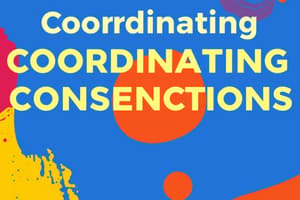Podcast
Questions and Answers
What is the primary function of coordinating conjunctions in a sentence?
What is the primary function of coordinating conjunctions in a sentence?
- To introduce dependent clauses
- To indicate cause and effect
- To join words, phrases, and clauses of equal grammatical rank (correct)
- To create complex sentences
Which coordinating conjunction would you use to show contrast?
Which coordinating conjunction would you use to show contrast?
- Or
- But (correct)
- So
- And
Which of the following sentences uses a coordinating conjunction correctly?
Which of the following sentences uses a coordinating conjunction correctly?
- I wanted to go swimming, for it was too cold.
- He would like to travel; yet, he has no money.
- She likes neither tea or coffee.
- I could go to the mall, but I need to finish my homework first. (correct)
What mnemonic can be used to remember the common coordinating conjunctions?
What mnemonic can be used to remember the common coordinating conjunctions?
Which coordinating conjunction indicates a choice or alternative?
Which coordinating conjunction indicates a choice or alternative?
Which sentence correctly utilizes the coordinating conjunction 'for'?
Which sentence correctly utilizes the coordinating conjunction 'for'?
Which coordinating conjunction indicates a result or consequence?
Which coordinating conjunction indicates a result or consequence?
How do subordinating conjunctions differ from coordinating conjunctions?
How do subordinating conjunctions differ from coordinating conjunctions?
Which of the following is NOT an example of a subordinating conjunction?
Which of the following is NOT an example of a subordinating conjunction?
What is a key characteristic of correlative conjunctions?
What is a key characteristic of correlative conjunctions?
Which sentence correctly uses a subordinating conjunction?
Which sentence correctly uses a subordinating conjunction?
Which of these pairs is NOT a common example of correlative conjunctions?
Which of these pairs is NOT a common example of correlative conjunctions?
Which word or phrase serves as a transition between ideas in writing?
Which word or phrase serves as a transition between ideas in writing?
Which example illustrates the use of correlative conjunctions effectively?
Which example illustrates the use of correlative conjunctions effectively?
In the context of writing, what is the primary function of transitions?
In the context of writing, what is the primary function of transitions?
Which sentence best demonstrates the use of a transitional phrase?
Which sentence best demonstrates the use of a transitional phrase?
Flashcards
Coordinating Conjunctions
Coordinating Conjunctions
Words that join words, phrases, or clauses of equal grammatical importance.
FANBOYS
FANBOYS
An acronym for the seven coordinating conjunctions.
For (conjunction)
For (conjunction)
Shows the reason or purpose of an action.
And (conjunction)
And (conjunction)
Signup and view all the flashcards
Nor (conjunction)
Nor (conjunction)
Signup and view all the flashcards
But (conjunction)
But (conjunction)
Signup and view all the flashcards
Or (conjunction)
Or (conjunction)
Signup and view all the flashcards
Yet (conjunction)
Yet (conjunction)
Signup and view all the flashcards
Common Subordinating Conjunctions
Common Subordinating Conjunctions
Signup and view all the flashcards
Correlative Conjunctions
Correlative Conjunctions
Signup and view all the flashcards
Both/And
Both/And
Signup and view all the flashcards
Whether/Or
Whether/Or
Signup and view all the flashcards
Transitions in Writing
Transitions in Writing
Signup and view all the flashcards
Types of Transitions
Types of Transitions
Signup and view all the flashcards
Using Transitions effectively
Using Transitions effectively
Signup and view all the flashcards
Study Notes
Coordinating Conjunctions
- Coordinating conjunctions join words, phrases, and clauses of equal grammatical rank.
- Common coordinating conjunctions are for, and, nor, but, or, yet, and so.
- Remember them using the mnemonic device FANBOYS.
- They connect words, phrases, and independent clauses to make sentences more complete.
Examples of Coordinating Conjunctions in Sentences
- I go to the park every Sunday, for I love to watch the ducks on the lake.
- I watch the ducks on the lake and the shirtless men playing soccer.
- Soccer is entertaining in winter, but it's better in the heat of summer.
- I always take a book to read, yet I never seem to turn a single page.
- I'm dating one of the players, so I watch the soccer game each week.
Explanations of Coordinating Conjunctions
- For: Shows reason or purpose (similar to "because").
- And: Adds one thing to another.
- Nor: Presents an alternative negative idea to a previously stated negative idea.
- But: Shows contrast.
- Or: Presents an alternative or a choice.
- Yet: Introduces a contrasting idea that logically follows the preceding idea.
- So: Indicates effect, result, or consequence.
Subordinating Conjunctions
- Subordinating conjunctions introduce dependent clauses, connecting them to independent clauses.
- Dependent clauses cannot stand alone as complete sentences.
- Independent clauses can stand alone as complete sentences.
- Common subordinating conjunctions: although, as, because, before, how, if, once, since, than, that, though, until, when, whenever, where, whether, while, why.
Correlative Conjunctions
- Correlative conjunctions are tag-team conjunctions that come in pairs.
- They connect equal grammatical elements in a sentence.
- Common correlative conjunctions: both/and, whether/or, either/or, neither/nor, not only/but also.
- Both parts of the pair must connect similar grammatical structures in the sentence.
Definition of Transition
- Transitions are words and phrases that connect ideas, sentences, and paragraphs.
- They improve the flow of writing and help readers understand the relationships between ideas.
- Transitions categorize relationships, including cause and effect, sequence, comparison/contrast, examples, purpose, and time or location.
Studying That Suits You
Use AI to generate personalized quizzes and flashcards to suit your learning preferences.



